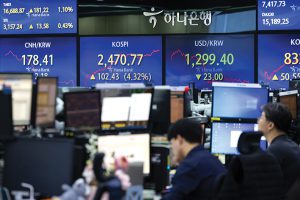BLOOMBERG
The boost to South Korean stocks from the ban on short-selling has quickly faded, with an index of small-cap stocks erasing all the gains seen following the regulator’s surprise decision. The Kosdaq Index slid 1.9% on Monday. It has fallen in every single session since the ban sparked a 7.3% jump on November 6. Electric vehicle battery names including Ecopro BM Co, Ecopro Co and L&F Co have been the biggest drags on the gauge over the past week. The benchmark Kospi Index ended down 0.2%. It has also reversed the bulk of its advance seen following the move.
The Kosdaq notched its best one-day rally in more than three years last Monday, which many market watchers attributed to a covering of some short positions. However, global investors and local funds have since reduced positions in a sign that they are looking beyond the ban to focus on fundamental factors such as earnings and the broader global equities backdrop. Retail investors have continued to boost holdings.
“The ban’s market-boosting impact has ended,” said Cho Junkee, an analyst at SK Securities Co, adding that investors will likely be keen on macroeconomic factors and corporate fundamentals. “Rather than covering their short positions on the EV battery names, foreign funds seem to be keeping their shorts on expectations that they may fall further.”
Korea’s Financial Services Commission prohibited short selling in stocks on the Kospi 200 Index and Kosdaq 150 Index through the end of June 2024, but the decision didn’t apply to existing bearish positions. While pandemic-era curbs on the practice of selling borrowed shares had been lifted for those two gauges in May 2021, the ban had remained in place for some 2,000 stocks.
The regulator’s latest move followed repeated complaints by the legions of local retail investors against the impact of short selling on Korea’s $1.7 trillion equity market, and came just months before general elections for the National Assembly in April.
 The Gulf Time Newspaper One of the finest business newspapers in the UAE brought to you by our professional writers and editors.
The Gulf Time Newspaper One of the finest business newspapers in the UAE brought to you by our professional writers and editors.
